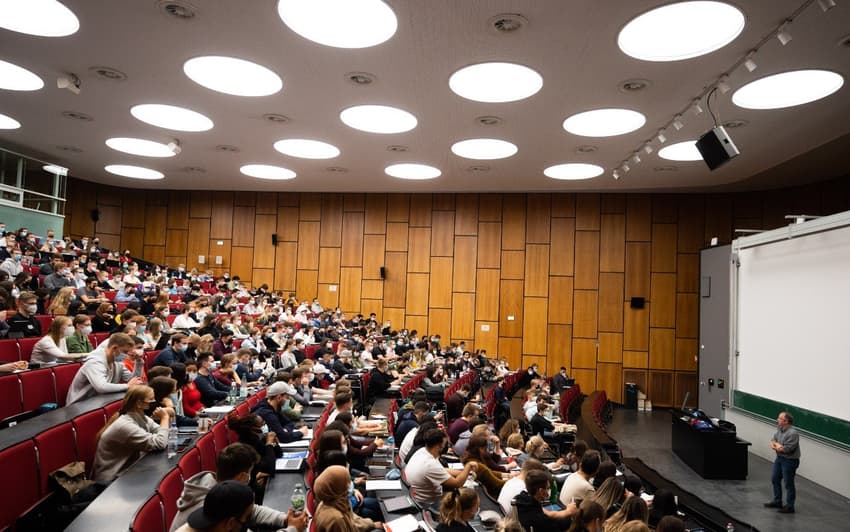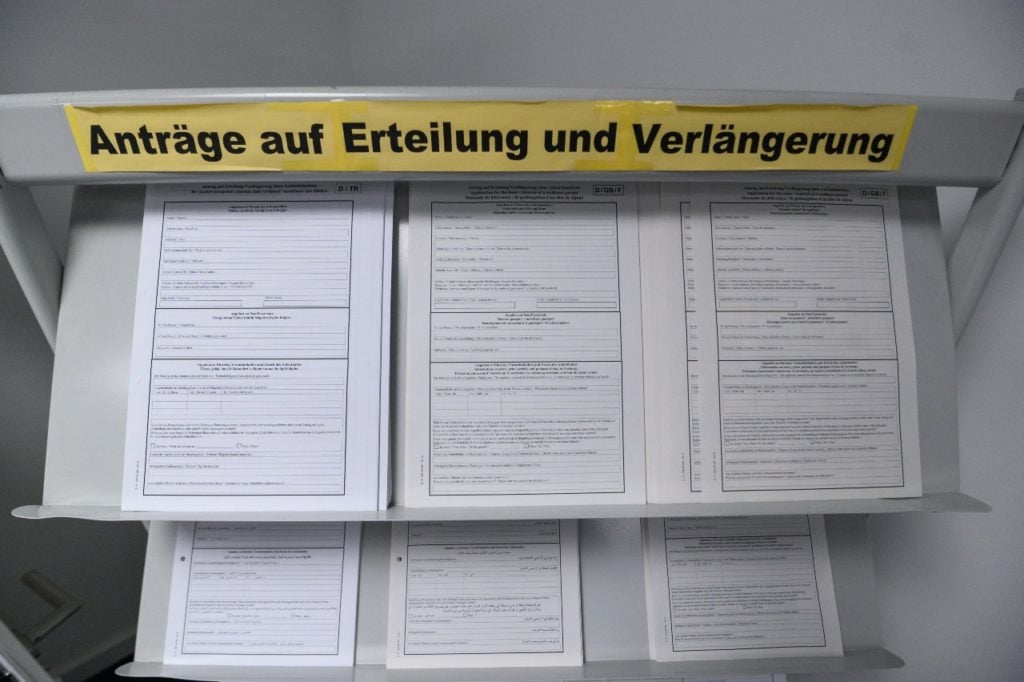How do I get a student visa for Germany and what does it let me do?

Germany offers an excellent quality of education for much lower fees than universities in most English-speaking countries. Plus, a student visa comes with a few extra advantages – if you can get your head around the bureaucracy. Here's what you need to know.
In stark contrast to many countries – particularly English-speaking ones – where tuition fees can run you up a bill into the thousands every semester, studying at a German university comes at a typical price tag in the hundreds, yes hundreds, of euros per year. Rather than explicit tuition fees, students at German public universities, even non-EU international ones, pay an “administrative fee” of around €300 a semester, which often includes a transport ticket.
That’s on top of Germany having high quality education and offering a relatively affordable environment for students.
But as with so many things about life in Germany, the key question is: what about the bureaucracy?
While it comes with its fair share of paperwork, a German student visa is a bit simpler to figure out than many other German visas, and it comes with some important privileges other countries don’t always have for their student visas.
READ ALSO: EXPLAINED: The different types of higher education in Germany
Who needs a student visa vs. a student residence permit?
Germany’s residence permit system of immigration means that you generally apply for your right to stay in the country to pursue your studies from your local immigration office after you’ve already arrived, found accommodation, and registered with your local authority at the Bürgeramt.
Any non-EU citizen staying in Germany for longer than three months to study at a German public university, accredited private university, or technical institute needs to apply for this permit.
To get it, you’ll need to make an appointment with your local immigration office and bring your cache of documents. The most important of these, rather obviously, is a certificate confirming your enrolment in an accredited study programme. You’ll also obviously need your application form, biometric pictures, and your valid passport with your valid visa to enter Germany – if you needed one to travel to the country.

A sign on the State Office for Immigration (LEA) on Friedrich-Krause-Ufer in Berlin. Photo: picture alliance/dpa | Jörg Carstensen
You may also be asked for proof of health insurance and financial resources to support yourself, which typically will be a deposit in a blocked account proving you have enough money to live in Germany for a year. This is typically just under €1,000 a month. You may also be asked for the same documents you will have used to register your address with your local authority – such as your rental contract or letter from your landlord confirming your address. Then you’ll need to pay the fee.
READ ALSO: Tip of the week: How to open a blocked account in Germany
As many veterans of German bureaucracy might tell you: when in doubt, bring every document you can.
Once your residence permit is granted, you can stay in Germany up to the end of its validity. If you don’t finish your studies by the time it runs out, you can typically apply to extend it by booking another appointment at your local or regional immigration office and providing proof of progress in your studies.
While all non-EU students generally need a residence permit, not everyone needs a student visa to enter the country. If you’re a national of a country that enjoys visa-free travel with Germany, you can enter Germany without applying for a student visa first and stay for up to three months while waiting for your student residence permit to be processed.

Visa application forms at Hamburg Foreigner's Office. Recent graduates of German universities are entitled to a special type of jobseeker's visa, and a shorter wait to permanent residence if they find a job. Photo: picture alliance/dpa | Jonas Walzberg
Students who aren’t from a country with visa-free travel with Germany will need to apply for a student visa at a German embassy or consulate abroad to be able to enter Germany. They’ll typically need the same documents as a residence permit applicant will need, along with certain identity documents, like their birth certificate.
Can I work as a student in Germany?
Yes. But there is a limit on how much time you can work while studying. Non-EU students can generally work up to 120 full days per six-month semester – or 240 half days – without approval from immigration offices. This doesn’t count any work that students might do while on semester break, during which no limit applies.
Self-employment is also allowed, but does need the permission of the relevant immigration office, which will determine whether the self-employed work could jeopardise studies.
That said, the government is currently in the process of loosening these rules to make studying in Germany more attractive - and affordable - for people from abroad. New, looser rules could potential come in later this year.
READ ALSO: KEY POINTS: What's in Germany's new draft law on skilled immigration?
What happens after I graduate?
Owing to the country’s skilled labour shortage, after you graduate your programme in Germany, you can renew your student residence permit and stay in the country for up to 18 months to find a position relating to your qualifications.
If you find a relevant job, you can then convert your student permit into an applicable work visa and stay in Germany to work.
For more information on how that works, you can check out our dedicated article on the subject.
READ ALSO: How to stay in Germany after graduating from a German university
Comments
See Also
In stark contrast to many countries – particularly English-speaking ones – where tuition fees can run you up a bill into the thousands every semester, studying at a German university comes at a typical price tag in the hundreds, yes hundreds, of euros per year. Rather than explicit tuition fees, students at German public universities, even non-EU international ones, pay an “administrative fee” of around €300 a semester, which often includes a transport ticket.
That’s on top of Germany having high quality education and offering a relatively affordable environment for students.
But as with so many things about life in Germany, the key question is: what about the bureaucracy?
While it comes with its fair share of paperwork, a German student visa is a bit simpler to figure out than many other German visas, and it comes with some important privileges other countries don’t always have for their student visas.
READ ALSO: EXPLAINED: The different types of higher education in Germany
Who needs a student visa vs. a student residence permit?
Germany’s residence permit system of immigration means that you generally apply for your right to stay in the country to pursue your studies from your local immigration office after you’ve already arrived, found accommodation, and registered with your local authority at the Bürgeramt.
Any non-EU citizen staying in Germany for longer than three months to study at a German public university, accredited private university, or technical institute needs to apply for this permit.
To get it, you’ll need to make an appointment with your local immigration office and bring your cache of documents. The most important of these, rather obviously, is a certificate confirming your enrolment in an accredited study programme. You’ll also obviously need your application form, biometric pictures, and your valid passport with your valid visa to enter Germany – if you needed one to travel to the country.

You may also be asked for proof of health insurance and financial resources to support yourself, which typically will be a deposit in a blocked account proving you have enough money to live in Germany for a year. This is typically just under €1,000 a month. You may also be asked for the same documents you will have used to register your address with your local authority – such as your rental contract or letter from your landlord confirming your address. Then you’ll need to pay the fee.
READ ALSO: Tip of the week: How to open a blocked account in Germany
As many veterans of German bureaucracy might tell you: when in doubt, bring every document you can.
Once your residence permit is granted, you can stay in Germany up to the end of its validity. If you don’t finish your studies by the time it runs out, you can typically apply to extend it by booking another appointment at your local or regional immigration office and providing proof of progress in your studies.
While all non-EU students generally need a residence permit, not everyone needs a student visa to enter the country. If you’re a national of a country that enjoys visa-free travel with Germany, you can enter Germany without applying for a student visa first and stay for up to three months while waiting for your student residence permit to be processed.

Students who aren’t from a country with visa-free travel with Germany will need to apply for a student visa at a German embassy or consulate abroad to be able to enter Germany. They’ll typically need the same documents as a residence permit applicant will need, along with certain identity documents, like their birth certificate.
Can I work as a student in Germany?
Yes. But there is a limit on how much time you can work while studying. Non-EU students can generally work up to 120 full days per six-month semester – or 240 half days – without approval from immigration offices. This doesn’t count any work that students might do while on semester break, during which no limit applies.
Self-employment is also allowed, but does need the permission of the relevant immigration office, which will determine whether the self-employed work could jeopardise studies.
That said, the government is currently in the process of loosening these rules to make studying in Germany more attractive - and affordable - for people from abroad. New, looser rules could potential come in later this year.
READ ALSO: KEY POINTS: What's in Germany's new draft law on skilled immigration?
What happens after I graduate?
Owing to the country’s skilled labour shortage, after you graduate your programme in Germany, you can renew your student residence permit and stay in the country for up to 18 months to find a position relating to your qualifications.
If you find a relevant job, you can then convert your student permit into an applicable work visa and stay in Germany to work.
For more information on how that works, you can check out our dedicated article on the subject.
READ ALSO: How to stay in Germany after graduating from a German university
Join the conversation in our comments section below. Share your own views and experience and if you have a question or suggestion for our journalists then email us at [email protected].
Please keep comments civil, constructive and on topic – and make sure to read our terms of use before getting involved.
Please log in here to leave a comment.